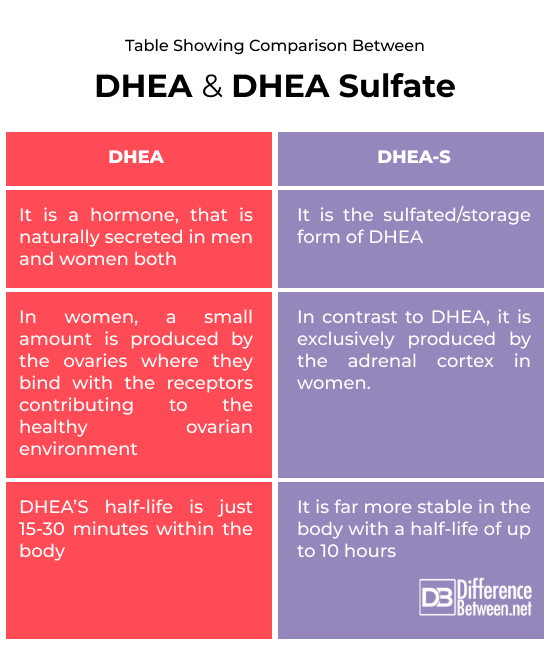Comparison Between DHEA and DHEA Sulfate

What is DHEA?
Dehydroepiandrosterone is an endogenous hormone that converts into male and female genital hormones referred as testosterone and estrogen within the body. It is secreted by adrenal glands and liver in the body.
- It’s levels spike in early adulthood in the body and then keep reducing as you get older, in depression and post-menopause.
The synthetic versions of DHEA are also available as a tablet, capsules, powders, topical ointments, and gels.
Uses
DHEA supplements are used as an:
- Anti-aging therapy: Taking DHEA orally or applying topically might improve skin appearance after menopause and in people over the age of 60 years.
- To improve physical activity.
- To treat depression: Taking 30-500 mg of DHEA orally daily seems to improve symptoms of depression.
- Menopause.: After menopause vaginal atrophy starts occurring, thus DHEA helps in improving vaginal dryness.
- Infertility: Taking DHEA orally before in-vitro fertilization (IVF) might improve the chances of pregnancy within a year of its intake, hence it is not clear if taking DHEA can help prevent miscarriages after IVF or not.
Side Effects
Oral Supplements: DHEA is usually safe for a short period or In a limited dose of 50mg per day for up to 2 yrs. Its side effects are usually mild and might include:
- Acne
- Hair loss
- GIT discomfort.
- High blood pressure
- Alteration in the menstrual cycle
- Facial hair growth in Women
- Fatigue
- Headache
- Insomnia
- Irregular heartbeat
- Cancers (rarely and only in cases of chronic use with high doses above 50-100 mg daily).
Precautions
- Children and pregnant/ nursing women should avoid DHEA supplements as no research done for their safety.
- Cardiac disease, stroke patients should avoid DHEA.
- Liver diseases, diabetes mellitus, high serum cholesterol , TSH disease, blood disorders, and hormonal imbalances should only use the supplement by consulting their physician.
- Tumors such as prostate, breast, or ovarian must not take DHEA.
- High serum DHEA levels have been associated to the psychotic disorders therefore candidates with history of psychologic disorders should only use it under medical supervision.
- In PCOS, DHEA may not be advised.

What is DHEA- Sulfate
Dehydroepiandrosterone sulfate, (DHEA-S) is an endogenous steroid that is secreted by adrenal cortex. It is β-sulfate ester and a metabolic form of dehydroepiandrosterone that circulates in the bloodstream in much greater concentrations than DHEA. It is a male sex hormone that is found both in men and women in the form of testosterone and estrogens. It is also involved in the development of male sexual characteristics at the time of puberty.
DHEA-S Test
The dehydroepiandrosterone sulfate test is used to detect:
- Whether the adrenal glands are functional or not.
- To diagnose adrenal cancers/tumors
- To determine the cause of masculine characteristics in women and early puberty among boys.
- To diagnose the congenital enlargement (hyperplasia) of the adrenal glands.
- Diagnose disorders of ovaries and the testicles.
Symptoms
High DHEA levels cause:
- Excess hair growth in the face and body.
- Mature voice
- Menstrual irregularities among girls
- Acne and scars
- Increased muscularity
- Loss of hair
Low DHEA levels Cause:
- Loss of hair
- Fatigue
- Nausea and vomiting
- Dizziness/drowsiness
- Dehydration and
- Salt/sodium cravings
- Decreased sex drive
- Erectile dysfunction syndrome etc
Table showing comparison between DHEA and DHEA Sulfate

SUMMARY OF DIFFERENCES:
DHEA is a hormone that is secreted in men, women both, whereas the sulfated/storage form of DHEA is known as DHEA-S.
In women, a small amount is produced by the ovaries where they bind with the receptors contributing to the healthy ovarian environment. In contrast to DHEA, DHEA-S is exclusively secreted by adrenal cortex in women.
DHEA’s half-life is just 15-30 minutes within the body meanwhile DHEA-S is far more stable in the body with a half-life of up to 10 hours.
FAQ
Are DHEA and DHEA-S the same thing?
DHEA is the hormone naturally secreted by the adrenal glands, which is later converted into and stored as DHEA-S in adrenal glands and the liver within body
What is DHEA sulfate used for?
DHEA-S test is used to diagnose adrenal gland secretions, tumors, or disorders of the testicles or ovaries.
What is another name for dehydroepiandrosterone sulfate?
DHEA-S is also known as androstenolone sulfate.
Does DHEA convert to DHEA-S?
DHEA converts into DHEA-S by the adrenal glands and the liver.
Who should not take DHEA supplements?
Candidates having cardiac issues, liver disease, diabetes, cholesterol, PCOS, and tumors such as breast, ovaries, and prostate.
- Difference Between Cystocele and Rectocele - September 8, 2023
- Comparison Between DHEA and DHEA Sulfate - September 1, 2023
- Difference Between Osteoporosis and Osteopenia - June 14, 2023
Search DifferenceBetween.net :
Leave a Response
References :
[0]WebMD. (n.d.). DHEA supplements: Uses and side effects. WebMD. https://www.webmd.com/diet/dhea-supplements
[1]Dehydroepiandrosterone and dehydroepiandrosterone sulfate (no date) Dehydroepiandrosterone and Dehydroepiandrosterone Sulfate - Health Encyclopedia - University of Rochester Medical Center. Available at: https://www.urmc.rochester.edu/encyclopedia/content.aspx?contenttypeid=167&contentid=dhea (Accessed: 11 June 2023).
[2]Dr.Samanthi (2023) What is the difference between DHEA and DHEA-S, Compare the Difference Between Similar Terms. Available at: https://www.differencebetween.com/what-is-the-difference-between-dhea-and-dhea-s/ (Accessed: 11 June 2023).
